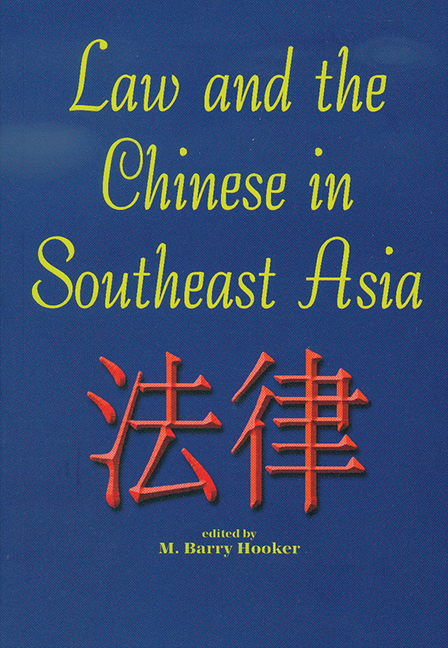Book contents
- Frontmatter
- Contents
- Preface
- The Contributors
- 1 Law and the Chinese Outside China: A Preliminary Survey of the Issues and the Literature
- 2 The Legal Position of the Ethnic Chinese in Indochina under French Rule
- 3 Law and Memory, De Jure to De Facto: Confucianization and its Implications for Family and Property in Vietnam
- 4 English Law and the Invention of Chinese Personal Law in Singapore and Malaysia
- 5 The Indonesian Chinese: “Foreign Orientals”, Netherlands Subjects, and Indonesian Citizens
- 6 Chinese Family Firms in Indonesia and the Question of “Confucian Corporatism”
- 7 China's Citizenship Law and the Chinese in Southeast Asia
- Index
6 - Chinese Family Firms in Indonesia and the Question of “Confucian Corporatism”
Published online by Cambridge University Press: 21 October 2015
- Frontmatter
- Contents
- Preface
- The Contributors
- 1 Law and the Chinese Outside China: A Preliminary Survey of the Issues and the Literature
- 2 The Legal Position of the Ethnic Chinese in Indochina under French Rule
- 3 Law and Memory, De Jure to De Facto: Confucianization and its Implications for Family and Property in Vietnam
- 4 English Law and the Invention of Chinese Personal Law in Singapore and Malaysia
- 5 The Indonesian Chinese: “Foreign Orientals”, Netherlands Subjects, and Indonesian Citizens
- 6 Chinese Family Firms in Indonesia and the Question of “Confucian Corporatism”
- 7 China's Citizenship Law and the Chinese in Southeast Asia
- Index
Summary
Just as some have given “Confucian capitalism” credit for much of East Asia's economic miracle, so have others blamed it for its apparent collapse. Thus, on the one hand, neo-Confucian values of frugality, diligence, group orientation, and respect for authority were said to have inspired the high savings rates, strong states, and corporate networks that fuelled economic growth. Yet, on the other, the same values are now alleged to have fostered the crony capitalism and failure to force the exit of insolvent capital that triggered economic collapse. In either case, the unexplored assumption is that culture is an independent variable in economic behaviour and performance, and is a common thread in overseas Chinese business networks and countries with Confucianist traditions.
As with economics, so too with law. Ever since Weber's study of China, orientalists have used culture to explain Asian legal behaviour and its relationship with formal law. A modern example is the notion of “Confucian corporatism”, which posits that East and Southeast Asia have Western-style corporate laws, yet the foundations of these laws — separate legal entity and separation of ownership and control — are antithetical to neo-Confucian business customs founded upon personal relationships, intricate networks, and family-controlled firms. The result is said to be a clash of business culture and formal law, which then has the effect of rendering law either inappropriate or ineffectual.
Yet, the role of culture in law and economic relations is not settled, and deserves greater analysis in the current economic and legal environment. To assume, without qualification, that culture is an independent variable risks legal reforms lacking in analytical justification. It is true, of course, that the traditional sociological view is that law is fundamentally rooted in culture: thus Weber viewed the Protestant work ethic as central to the rise of European capitalism and, ironically, Confucianism as historically obstructive of economic development in China. Recent times have seen, however, the rise of economic theories asserting a limited role for “culture” in legal activity. Indeed, neo-classical law and economics posit no role for culture: all economic and legal behaviour is seen simply as a rational response to price signals in relevant markets.
- Type
- Chapter
- Information
- Law and the Chinese in Southeast Asia , pp. 150 - 168Publisher: ISEAS–Yusof Ishak InstitutePrint publication year: 2002

